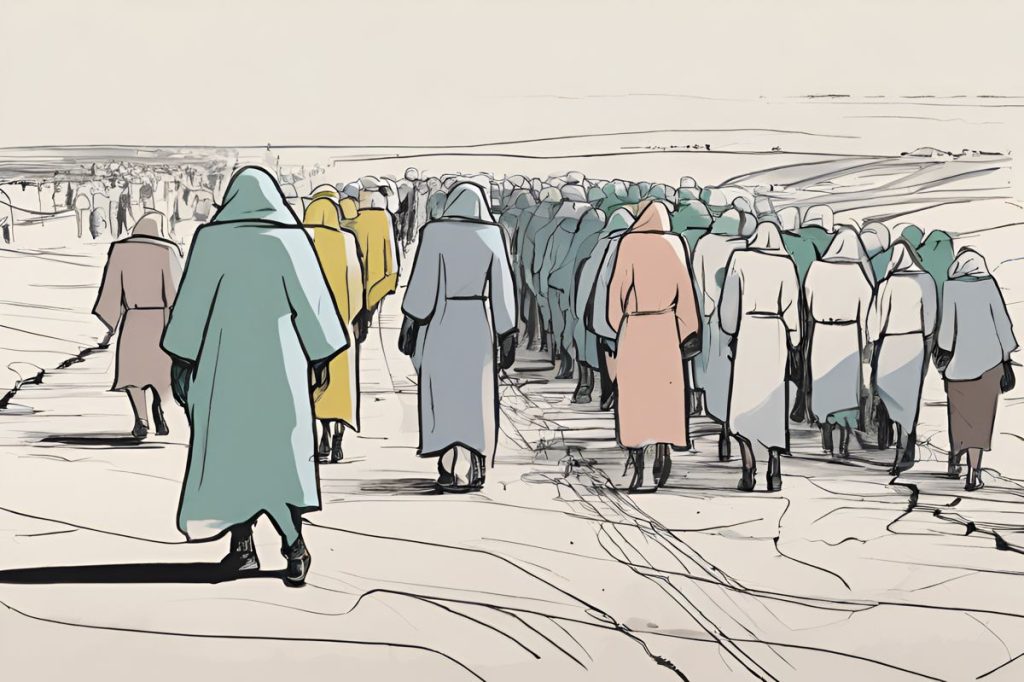The EU is pressuring Cyprus to allow 70 migrants stranded in the buffer zone access to asylum proceedings, in line with international protection rights. Despite local concerns, the EU Commission emphasizes the need to respect the migrants’ fundamental rights under the Geneva Convention and the Charter of Fundamental Rights.
What is the EU’s stance on the situation of migrants stranded in Cyprus’ buffer zone?
The EU insists that Cyprus must allow the 70 stranded migrants in the buffer zone access to asylum proceedings, as per the Charter of Fundamental Rights (Article 18) and the Geneva Convention. The EU Commission emphasizes the need to respect international protection rights, despite local concerns and legal challenges.
The Plight of Migrants at the Buffer Zone
The European Commission has insisted that Cyprus must fulfill its obligation to allow 70 migrants, currently stranded in the buffer zone, the ability to commence asylum proceedings. For several weeks, these individuals have found themselves unable to seek asylum, a situation that has led to widespread frustration and allegations of human rights violations. Deputy Minister for Migration Nicholas Ioannides visited Avlona, where the conflict between the needs of local residents and the humanitarian concerns for the migrants has become increasingly pronounced. The 14km fence along parts of the Green Line has been a point of contention, with locals condemning it as ineffective.
Adding to the complexity of the situation, a group of 46 migrants has filed a lawsuit against the government for being denied access to asylum proceedings. These individuals have been living in tents provided by the United Nations, caught in a limbo exacerbated by claims of police misconduct—including alleged pushbacks and forced relocations to the contested zone.
EU’s Legal Stance on Asylum Access
The European Union’s legal framework clearly supports the right of any person to seek international protection, regardless of whether they are at a border or in a transit zone. This stance is enshrined in the Charter of Fundamental Rights (Article 18) and respects the principles of the Geneva Convention. The EU Commission, while staying abreast of the situation in Cyprus, underscores the importance of providing access to asylum procedures for individuals in need of international protection.
During his visit, Ioannides pointed out the difficult journey the migrants had taken, traveling through Turkey—a nation he considers safe—to reach the buffer zone from the north. Despite the challenges, the Deputy Minister highlighted ongoing conversations with the UNHCR aiming for a resolution. The complexity of the issue, involving humanitarian, political, and legal factors, necessitates a broader dialogue for a sustainable solution.
Cyprus’s Stance and the Future Dialogue
The Cypriot government has taken a firm stance against transforming the buffer zone into a new route for migrants, citing concerns over creating new pathways for entering the Republic, especially in light of diminished sea arrivals. Ioannides emphasized the humanitarian aspect of the crisis and assured that the basic needs of the migrants were being met. The government remains focused on preventing the establishment of new irregular routes for migration, a factor that greatly complicates the potential for a straightforward resolution.
The situation clearly demands a delicate balance between humanitarian aid and the enforcement of immigration policies. As the lawsuit proceeds and the dialogue with various bodies continues, the international community looks on to see how Cyprus will navigate this complex humanitarian issue within the framework of its obligations under EU law and respect for human rights conventions.
What is the EU’s stance on the situation of migrants stranded in Cyprus’ buffer zone?
The EU insists that Cyprus must allow the 70 stranded migrants in the buffer zone access to asylum proceedings, as per the Charter of Fundamental Rights (Article 18) and the Geneva Convention. The EU Commission emphasizes the need to respect international protection rights, despite local concerns and legal challenges.
What is the legal framework of the European Union regarding asylum access?
The EU’s legal framework supports the right of any person to seek international protection, regardless of their location. This right is enshrined in the Charter of Fundamental Rights (Article 18) and aligns with the principles of the Geneva Convention. The EU Commission stresses the importance of providing access to asylum proceedings for individuals in need of international protection.
What is Cyprus’s stance on the issue of migrants in the buffer zone?
Cyprus has taken a firm stance against turning the buffer zone into a new migration route, expressing concerns about creating additional pathways for entering the Republic. While the government emphasizes meeting the basic needs of the migrants and the humanitarian aspect of the crisis, it is also focused on preventing the establishment of new irregular migration routes.
What are some of the challenges faced in resolving the situation of stranded migrants in Cyprus’ buffer zone?
The situation involves complex humanitarian, political, and legal factors, making it challenging to find a sustainable solution. Issues such as local concerns, legal challenges, allegations of human rights violations, and the need to balance humanitarian aid with immigration policies all contribute to the complexity of the matter. Ongoing dialogue with various entities and the international community’s scrutiny are crucial in navigating this multifaceted issue.

